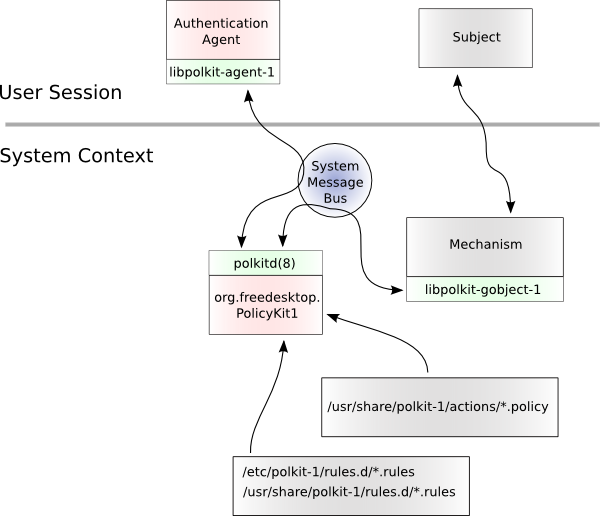|
Размер: 6598
Комментарий:
|
← Версия 7 от 2020-07-02 18:52:30 ⇥
Размер: 6604
Комментарий:
|
| Удаления помечены так. | Добавления помечены так. |
| Строка 128: | Строка 128: |
| ---- |
13. Granting privileged actions
Task: allow user to perform an action that lies off standard user permissions:
- mount an external drive
- restart service
- edit system-wide service settings
- run certain application with super-user rights
- …
Setuid/Setgid
- Simple, verifiable mechanism
Static (user always can perform an action if allowed)
Actually limits control to allow/disallow running certain binary
Simple examples:
-rws--x--x 1 root root 56680 may 22 17:20 /bin/mount
Runs as root, so user can mount external drives
- If there are restrictions, the program (mount) shall check them itself
-rwx--s--x 1 root shadow 10432 Jul 1 2018 /usr/bin/passwd
SETGID directory traversal
This is SETGID directory traversal example
The hash of user password is stored to the /etc/tcb/<user>/shadow: -rw-r----- 1 george auth 80 сен 19 2018 /etc/tcb/george/shadow
→ Process with UID george can read and write
The /etc/tcb/<user> directory is fully accessible for george user 1: drwx--s--- 2 george auth 4096 сен 19 2018 /etc/tcb/george
But /etc/tcb directory itself is not accessible by george or other users: drwx--x--- 62 root shadow 4096 мар 24 13:41 /etc/tcb
⇒ root solely has full access
the only exception is process that belongs to shadow group: it can, knowing the certain file/directory name in /etc/tcb, gain access to that certain file/directory
⇒ to gain an access to /etc/tcb/george/shadow the process shall belong to user george and to the 'shadow' group
…and that is the process run from /usr/bin/passwd!
Find all setgid binaries: find /*bin /usr/*bin -perm -2000 -ls
Su/Sudo
su — execute process with the rights of another user
Mainly used for obtaining root shell (su -) or for temporarily drop root privileges
sudo — execute process with the rights of another user, with
- user/group/category selection
- exact command specification (including command line arguments)
- shell patterns
- additional restrictions (environment filter, source or target user password requirement etc.)
- …
Su/sudo ar just setuid wrappers, still allowing certain user to run certain command.
Policy kit
Arch ilinux Wiki page (very informational as always)
Polkit is an application-level toolkit for defining and handling the policy that allows unprivileged processes to speak to privileged processes: It is a framework for centralizing the decision making process with respect to granting access to privileged operations for unprivileged applications.
- Built on the top of D-Bus
Rules are programmed (non just configs)

An authentication agent is used to make the user of a session prove that the user of the session really is the user (by authenticating as the user) or an administrative user (by authenticating as an administrator)
A policy file specifies actions:
- what kind of service is allowed
- after what kind of authentication
Stored at /usr/share/polkit-1/actions
- E. g.:
1 <?xml version="1.0" encoding="UTF-8"?> 2 <!DOCTYPE policyconfig PUBLIC 3 "-//freedesktop//DTD PolicyKit Policy Configuration 1.0//EN" 4 "http://www.freedesktop.org/software/polkit/policyconfig-1.dtd"> 5 <policyconfig> 6 7 <action id="org.archlinux.pkexec.gparted"> 8 <message>Authentication is required to run the GParted Partition Editor</message> 9 <icon_name>gparted</icon_name> 10 <defaults> 11 <allow_any>auth_admin</allow_any> 12 <allow_inactive>auth_admin</allow_inactive> 13 <allow_active>auth_admin</allow_active> 14 </defaults> 15 <annotate key="org.freedesktop.policykit.exec.path">/usr/bin/gparted</annotate> 16 <annotate key="org.freedesktop.policykit.exec.allow_gui">true</annotate> 17 </action> 18 19 </policyconfig>
A rule file is JavaScript-based snippet defining authorization rules
Pre-defined ones are stored at /usr/share/polkit-1/rules.d
Manually configured ones are stored at /etc/polkit-1/rules.d
- E. g.:
This rule file (/etc/polkit-1/rules.d/50-default.rules) defines how administrator authentication is performed:
A lot of rule examples here
See more on Arch linux page
Hardening and mandatory access mechanisms
Note: all these mechanisms are mechanisms of restriction, not of allowance
SELinux is a security enhancement to Linux which allows users and administrators more control over access control.
Works after POSIX ACL/DAC
- Can implement security schemes (scurity levels, user roles, categories atc)
Can control a huge amount of system calls
- Provides extension of inodes, network packets etc. carrying security labels
- Rules are pre-binded in kernel to eliminate attack
AppArmor is Mandatory Access Control (MAC) like security system for Linux. AppArmor confines individual programs to a set of files, capabilities, network access and rlimits, collectively known as the AppArmor policy for the program, or simply as a profile. New or modified policy can be applied to the running system without a reboot.
Works after POSIX ACL/DAC
- Operates with file paths instead of inodes and other low-lever objects
SMACK, SRBAC, …
Setgid bit here means all the files created under the directory will belong to the auth group; you may skip it, it's irrelevant (1)
